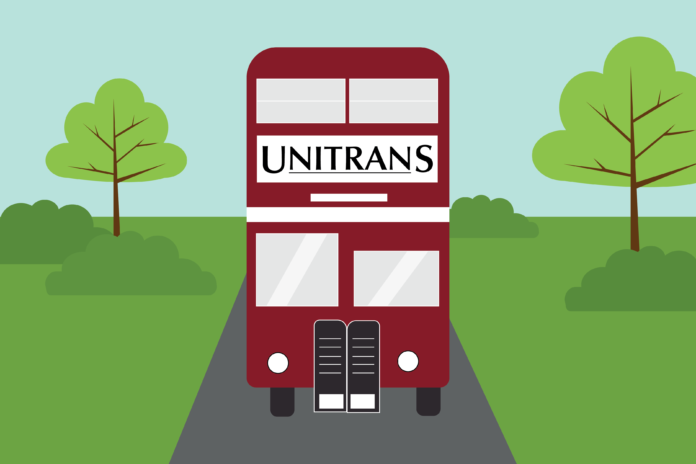The shift is part of a multi-year plan that involves a commitment by Unitrans to buy only electric vehicles going forward
By JADE BELL — campus@theaggie.org
On Sept. 21, Unitrans officially launched six electric buses, which, according to a recent press release, are a part of the university’s goal to improve sustainability on campus.
Jeff Flynn, the general manager of Unitrans, explained the importance of the addition of these electric buses.
“The University of California as a system and the city of Davis have really strong environmental goals and net-carbon-neutrality goals,” Flynn said. “Being a part of that mission, we thought it was important to buy electric buses and commit ourselves to only buying electric vehicles going forward.”
Before these buses began running regular routes, extensive testing operations took place. According to Flynn, all 100-plus Unitrans drivers completed training on them, and Unitrans worked with other transit services that use the same buses to learn from their experience. However, Flynn added that they’re still “learning as [they’re] going.”
The addition of the six electric buses is a part of the first phase of a longer project, and more electric buses will be added soon. Phase two of the electric-bus launch will then begin in 2025 and 2026.
“We have six, and they’re in service,” Flynn said. “We’ll have four more arriving in spring and four more the spring after that. So, that’s 14 buses in the next year and a half. And that’s called phase one. And then, [phase two] will be for another 10 to 15 electric buses.”
Job Tam, a Unitrans bus driver and a fourth-year international relations major, said that he is excited about the potential of these buses to help reduce fossil fuel emissions in Davis.
“I think it’s great to have electric buses,” Tam said via Instagram Direct Message. “The buses drive very comfortably and smoothly on the road. It feels the same as the natural gas buses, but quieter and with regenerative braking.”
Fourth-year political science and public service minor Olya Egorov, the president of the Zero Waste and Sustainability Club at UC Davis, expressed what they see as the wider implications of this change.
“[We’re] proud to see [UC Davis] add electric buses to their transportation system, bringing our community one step closer to achieving its Carbon Neutrality Initiative,” Egorov said via email. “We also believe UC Davis is taking a clear stance [to] encourage and help campuses across the country begin implementing carbon-neutral strategies.”
Siena Reale, a first-year environmental policy analysis and planning major, said that the buses are “a great step in the right direction.”
“I was very inspired by the way UC Davis is taking a lot of initiatives in sustainability and reducing carbon emissions on campus,” Reale said. “I think [that’s] in addition to the other things they have been doing, [the] dining halls and the low waste is one of the things that made me decide to come to this campus.”
Natalie Gutierrez, a fourth-year landscape architecture major, shared mixed feelings on the change, citing concerns regarding the potential waste of discarded older technology.
“It is exciting to see the shift to electric buses with Unitrans as they take the steps towards net-zero emissions,” Gutierrez said via email. “However, it is important to note that as technology advances, the demand to update it can cause large quantities of waste being discarded and transported elsewhere, contributing to multiple environmental hazards, which can adversely affect others. As we make the switch to reduce our carbon footprint, let’s ensure that our actions are sustainable all the way through.”
Written by: Jade Bell — campus@theaggie.org




